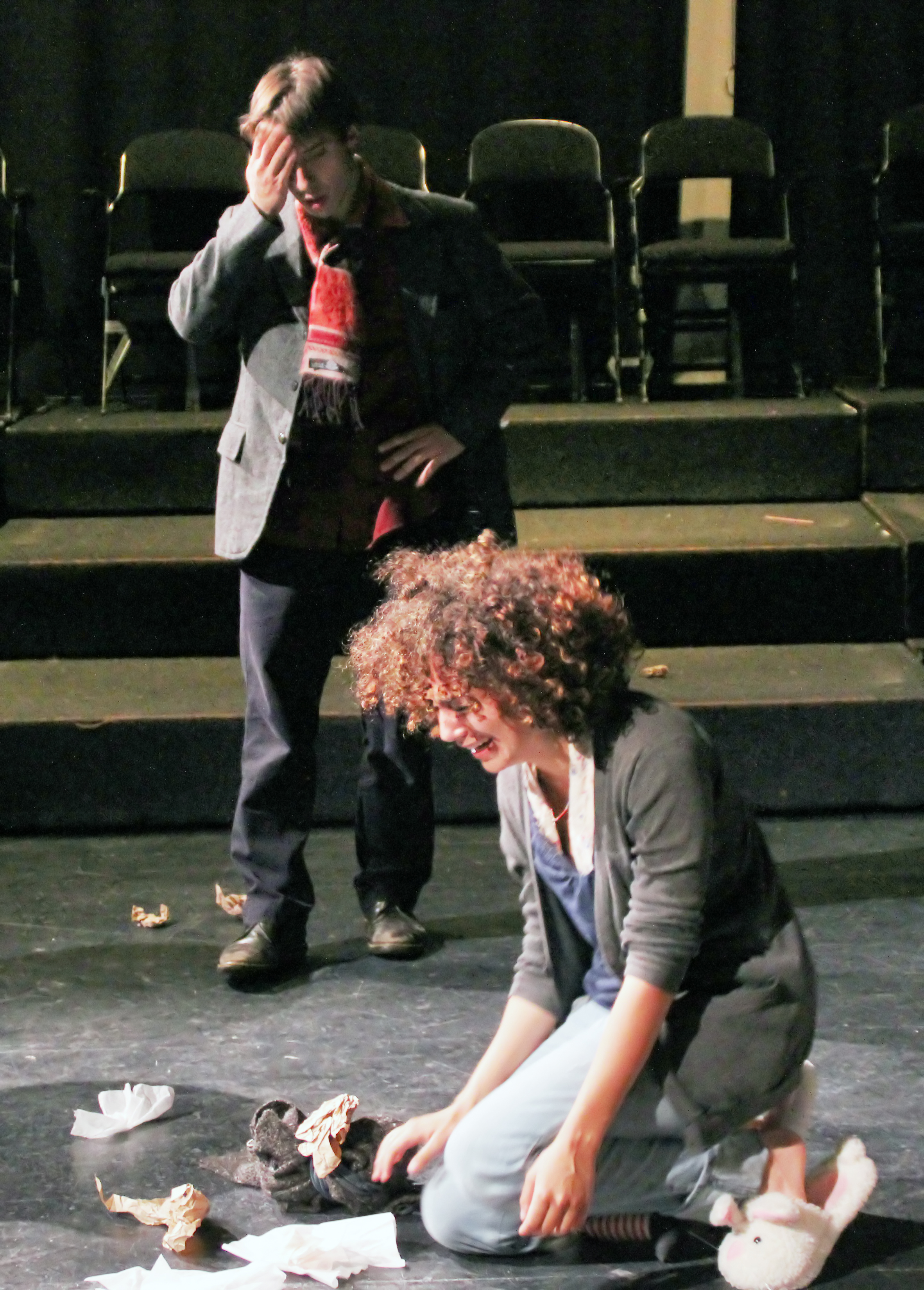Screen meets stage in The Coppola One Act Marathon

Graduate film student Bill Barker and second-year theater student Cynthia Mersten rehearse for “Kathleen Turner’s Ear.”
Today to Saturday, 7:30 p.m.
Macgowan 1340, FREE
By Michael Palumbo
June 2, 2011 12:05 a.m.

Graduate film student Bill Barker and director Judy Phu rehearse their production for The Coppola One Act Marathon, which will take place today to Saturday.
Correction: The original version of this article contained an error. “Wife-Away” is a play about husbands who have the right to remove their wives.
Cynthia Mersten was in hysterics. The second-year theater student threw props all over the floor, screaming and pounding the ground as Bill Barker, a graduate film student, watched in horror, unable to stop her.
This emotionally charged scenario is only a rehearsal, which became apparent when director Judy Phu stopped the two actors at the scene’s end, asking if they could do it all over again to make a slight adjustment.
Jonathan Edwards, a graduate playwriting student, presided over the rehearsal of his first full production.
The scene from “Kathleen Turner’s Ear,” is among three 40-minute one-act plays to be featured in The Coppola One Act Marathon, all written by first-year playwrights in the master of fine arts program at UCLA.
The first play to be showcased is Matt Quinlan’s “Wife-Away,” which is about husbands who have the right to remove their wives. Following this play will be Edwards’ “Kathleen Turner’s Ear,” and Tyler McClain’s “How to Prevent the French Revolution.” The marathon will take place today to Saturday in Macgowan 1340 at 7:30 p.m. There will be another performance in the afternoon on Saturday at 2 p.m.
The marathon is named after the acclaimed film director Francis Ford Coppola, who received his master of fine arts degree in film at UCLA in 1967. During later visits to campus, Coppola encouraged film students to direct one-act plays to refine their filmmaking skills by working with actors and narrative structure. In 1997, Coppola agreed to be involved in bringing playwrights together with graduate film directors in an annual presentation of student work.
Graduate directing students contribute to The Coppola One Act Marathon, which also features both undergraduate and graduate acting students.
Directing Edwards’ play is graduate directing student Phu. Throughout rehearsal, Phu abruptly interrupted actors, even mid-dialogue, adjusting their placement and asking for more emotion.
“The actors bring their own rhythm to the lines, and the cadence changes as a result,” Phu said.
Phu said the play underwent numerous revisions and alterations, as they learned what lines worked and what lines needed to be changed.
“Jon is a very specific writer with punctuation, italicization and bolding in the script to show how he wants the actors to deliver the lines. There’s a good sense of pacing and timing,” Phu said.
But, Phu said the entire process was a collaborative effort between four individuals to determine how the words came together.
“We change how the actors speak and look at each other to make the dialogue feel more real and truthful,” Phu said.
Together with Edwards and Phu, the two actors practiced four hours a day, five days a week, for the entire month of May in preparation for the three-night performances.
The script came into fruition after Edwards took a writing class in the fall. Edwards said he drew upon his personal romantic relationships for inspiration for the plot, which centers around a female character who becomes mentally and emotionally distraught as she struggles to keep the attention of a married man.
“We all have had situations where we know it’s not good for us, yet it still satisfies us, so we still do it.” Edwards said.
Edwards said he was able to relate to his characters’ dynamic and their struggles.
“Writing is wonderfully therapeutic. It’s a way to make events happen the way you want them to happen,” Edwards said. “You can hide behind the character’s voice and still get those demons out of you.”
McClain, a graduate playwriting student, said he has a slightly more comedic approach to writing. His play, “How to Prevent the French Revolution,” is a dark comedy.
McClain said the original story was a somber drama centered around the invention of the guillotine but felt more like a lecture about the French Revolution. He said the story now revolves around an inventor who continually creates tools that turn into things they’re not supposed to be used for.
“I like entertaining, and sharing your work with others is a way of channeling that desire into something productive and fun,” McClain said.


